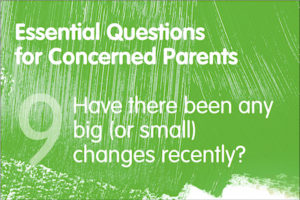 If your child’s circumstances change, he or she is likely to react to those changes. Is your child in a new school? Doing new, harder schoolwork? Dealing with your separation or divorce? Living in a new town? Dealing with a new sibling?
If your child’s circumstances change, he or she is likely to react to those changes. Is your child in a new school? Doing new, harder schoolwork? Dealing with your separation or divorce? Living in a new town? Dealing with a new sibling?
Did he or she move from a single room to a shared room? Have there been any changes in his or her diet or exercise? Was there more junk food intake than usual or less exercise during a long winter? Changes in circumstances matter. It makes sense to think through if any changes in your child’s circumstances or your family’s circumstances might be contributing to your child’s current distress or difficulties.
Your child’s natural development brings with it changes, too. Do you expect your toddler not to want to hold the spoon himself or herself at some point? Is that a completely unexpected battle? Do you expect your sweet child not to grow rebellious when adolescence hits? Do you expect your child not to be affected by the documentary he or she just watched that suddenly causes him or her to become a vegetarian, a pacifist, a Buddhist, or an artist? Your child is organizing and reorganizing his or her inner world and that constant inner constructing amounts to real and sometimes significant change. Should you construe that new attitude or behavior as a “symptom” or as a change? Why the former and not the latter?
Your child’s circumstances may have changed and your child’s inner reality may have changed. Mustn’t all that be factored in as you try to figure out what’s going on?
*****
Read the Concerned Parents’ Project Introductory Post.
To get in touch or to share your feedback, please email us.
Read more on this topic
One Family’s Encounter with Modern Psychiatry and a Call for Social Change
Visit Parent Resources for additional in-depth articles.














